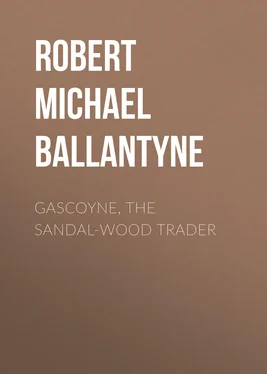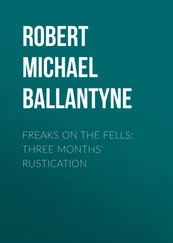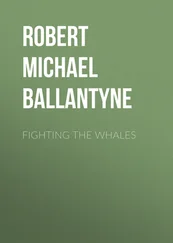Robert Michael Ballantyne - Gascoyne, the Sandal-Wood Trader
Здесь есть возможность читать онлайн «Robert Michael Ballantyne - Gascoyne, the Sandal-Wood Trader» — ознакомительный отрывок электронной книги совершенно бесплатно, а после прочтения отрывка купить полную версию. В некоторых случаях можно слушать аудио, скачать через торрент в формате fb2 и присутствует краткое содержание. Жанр: Детские приключения, literature_19, foreign_antique, foreign_prose, foreign_children, на английском языке. Описание произведения, (предисловие) а так же отзывы посетителей доступны на портале библиотеки ЛибКат.
- Название:Gascoyne, the Sandal-Wood Trader
- Автор:
- Жанр:
- Год:неизвестен
- ISBN:нет данных
- Рейтинг книги:3 / 5. Голосов: 1
-
Избранное:Добавить в избранное
- Отзывы:
-
Ваша оценка:
- 60
- 1
- 2
- 3
- 4
- 5
Gascoyne, the Sandal-Wood Trader: краткое содержание, описание и аннотация
Предлагаем к чтению аннотацию, описание, краткое содержание или предисловие (зависит от того, что написал сам автор книги «Gascoyne, the Sandal-Wood Trader»). Если вы не нашли необходимую информацию о книге — напишите в комментариях, мы постараемся отыскать её.
Gascoyne, the Sandal-Wood Trader — читать онлайн ознакомительный отрывок
Ниже представлен текст книги, разбитый по страницам. Система сохранения места последней прочитанной страницы, позволяет с удобством читать онлайн бесплатно книгу «Gascoyne, the Sandal-Wood Trader», без необходимости каждый раз заново искать на чём Вы остановились. Поставьте закладку, и сможете в любой момент перейти на страницу, на которой закончили чтение.
Интервал:
Закладка:
Six years previous to the opening of our tale, he had come to Sandy Cove with his wife and child, the latter a girl of six years of age at that time. In one year death bereaved the missionary of his wife, and, about the same time, war broke out in the island between the chiefs who clung to the idolatrous rites and bloody practices peculiar to the inhabitants of the South Sea islands, and those chiefs who were inclined to favour Christianity. This war continued to rage more or less violently for several years, frequently slumbering, sometimes breaking out with sudden violence, like the fitful eruptions of the still unextinct volcanoes in those distant regions.
During all this period of bloodshed and alarms, the missionary stuck to his post. The obstinacy of hatred was being gradually overcome by the superior pertinacity of zeal in a good cause, and the invariable practice—so incomprehensible to the savage mind—of returning good for evil; the result was, that the Sabbath bell still sent its tinkling sound over the verdant slopes above Sandy Cove, and the hymn of praise still arose, morning and evening, from the little church, which, composed partly of wood, partly of coral rock, had been erected under the eye, and, to a large extent, by the hands of the missionary.
But false friends within the camp were more dangerous and troublesome to Mr Mason than avowed enemies without. Some of the European traders, especially, who settled on the island a few years after the missionary had made it habitable, were the worst foes he had to contend with.
In the same vessel that brought the missionary to the island, there came a widow, Mrs Stuart, with her son Henry, then a stout lad of thirteen. The widow was not, however, a member of the missionary’s household. She came there to settle with her son, who soon built her a rudely constructed but sufficiently habitable hut, which, in after years, was enclosed, and greatly improved; so that it at last assumed the dimensions of a rambling picturesque cottage, whitewashed, brilliant, and neat in its setting of bright green.
The widow, although not an official assistant to the missionary, was nevertheless a most efficient one. She taught in his schools, being familiar with the native tongue; and, when the settlement grew in numbers, both of white and black, she became known as the good angel of the place—the one who was ever ready with sympathy for the sorrowful, and comfort for the dying. She was fair and fragile, and had been exceedingly beautiful; but care had stamped his mark deeply in her brow. Neither care nor time, however, could mar the noble outline of her fine features, or equal the love that beamed in her gentle eyes.
The widow was a great mystery to the gossips of Sandy Cove; for there are gossips even in the most distant isles of the sea! Some men (we refer, of course, to white men) thought that she must have been the wife of an admiral at least, and had fallen into distressed circumstances, and gone to these islands to hide her poverty. Others said she was a female Jesuit in disguise, sent there to counteract the preaching of the gospel by the missionary. A few even ventured to hint their opinion that she was an outlaw, “or something of that sort” and shrewdly suspected that Mr Mason knew more about her than he was pleased to tell. But no one, either by word or look, had ever ventured to express an opinion of any kind to herself, or in the hearing of her son; the latter, indeed, displayed such uncommon breadth of shoulders, and such unusual development of muscle, that it was seldom necessary for him—even in those savage regions and wild times—to display anything else, in order to make men respectful.
While our three friends were doing justice to the bacon and breadfruit set before them by Widow Stuart, the widow herself was endeavouring to repress some strong feeling, which caused her breast to heave more than once, and induced her to turn to some trifling piece of household duty to conceal her emotion. These symptoms were not lost upon her son, whose suspicions and anger had been aroused by the familiarity of Gascoyne. Making some excuse for leaving the room, towards the conclusion of the meal, he followed his mother to an outhouse, whither she had gone to fetch some fresh milk.
“Mother,” said Henry, respectfully, yet with an unwonted touch of sternness in his voice; “there is some mystery connected with this man Gascoyne that I feel convinced, you can clear up—”
“Dear Henry,” interrupted the widow, and her cheek grew pale as she spoke, “do not, I beseech you, press me on this subject. I cannot clear it up.”
“Say you will not, mother,” answered Henry, in a tone of disappointment.
“I would if I dared,” continued the widow. “The time may come when I—”
“But why not now,” urged the youth, hastily. “I am old enough, surely, to be trusted. During the four visits this man has paid to us, I have observed a degree of familiarity on his part which no man has a right to exhibit towards you; and which, did I not see that you permit it, no man would dare to shew. Why do you allow him to call you ‘Mary?’ No one else in the settlement does so.”
“He is a very old friend,” replied the widow, sadly. “I have known him from childhood. We were playmates long ago.”
“Humph! that’s some sort of reason, no doubt; but you don’t appear to like him, and his presence always seems to give you pain. Why do you suffer yourself to be annoyed by him? Only say the word, mother, and I’ll kick him out of the house, neck and crop—”
“Hush, boy; you are too violent.”
“Too violent! Why, it would make a coward violent, to see his mother tormented as you are by this fellow, and not be allowed to put a stop to it. I suspect—”
“Henry,” said the widow, again interrupting her exasperated son, “do you think your mother would do what is wrong?”
“Mother,” exclaimed the youth, seizing her hand, and kissing her brow almost violently, “I would as soon think that the angels above would do wrong; but I firmly believe that you are suffering wrong to be done to you ; and—just listen to the fellow, I do believe he’s howling for more bacon at this moment!”
There could be no doubt whatever about the fact; for just then the deep tones of Gascoyne’s voice rang through the cottage, as he reiterated the name of the widow, who hastened away, followed by her son. Henry scarcely took the trouble to conceal the frown that darkened his brow as he re-entered the apartment where his companions were seated.
“Why, Mary, your bacon surpasses anything I have tasted for the last six months; let’s have another rasher, like a good woman. That mountain air sharpens the appetite amazingly; especially of men who are more accustomed to mount the rigging of a ship than the hills on shore. What say you, John Bumpus?”
John Bumpus could not at that moment say anything, in consequence of his mouth being so full of the bacon referred to, that there was no room for a single word to pass his lips. In the height of his good-humour, however, he did his best by signs to express his entire approval of the widow’s provender, and even attempted to speak. In so doing, he choked himself, and continued in convulsions for the next five minutes, to the immense delight of the captain, who vowed he had never before seen such a blue face in the whole course of his life.
While this scene was enacting, and ere Jo Bumpus had effectually wiped away the tears from his eyes, and cleared the bacon out of his windpipe, the door opened, and the commander of H.M.S. Talisman entered.
Edmund Montague was a young man to hold such a responsible position in the navy; but he was a bold, vigorous little Englishman—a sort of gentlemanly and well-educated John Bull terrier; of frank address, agreeable manners, and an utterly reckless temperament, which was qualified and curbed, however, by good sense, and hard-earned experience.
Читать дальшеИнтервал:
Закладка:
Похожие книги на «Gascoyne, the Sandal-Wood Trader»
Представляем Вашему вниманию похожие книги на «Gascoyne, the Sandal-Wood Trader» списком для выбора. Мы отобрали схожую по названию и смыслу литературу в надежде предоставить читателям больше вариантов отыскать новые, интересные, ещё непрочитанные произведения.
Обсуждение, отзывы о книге «Gascoyne, the Sandal-Wood Trader» и просто собственные мнения читателей. Оставьте ваши комментарии, напишите, что Вы думаете о произведении, его смысле или главных героях. Укажите что конкретно понравилось, а что нет, и почему Вы так считаете.












